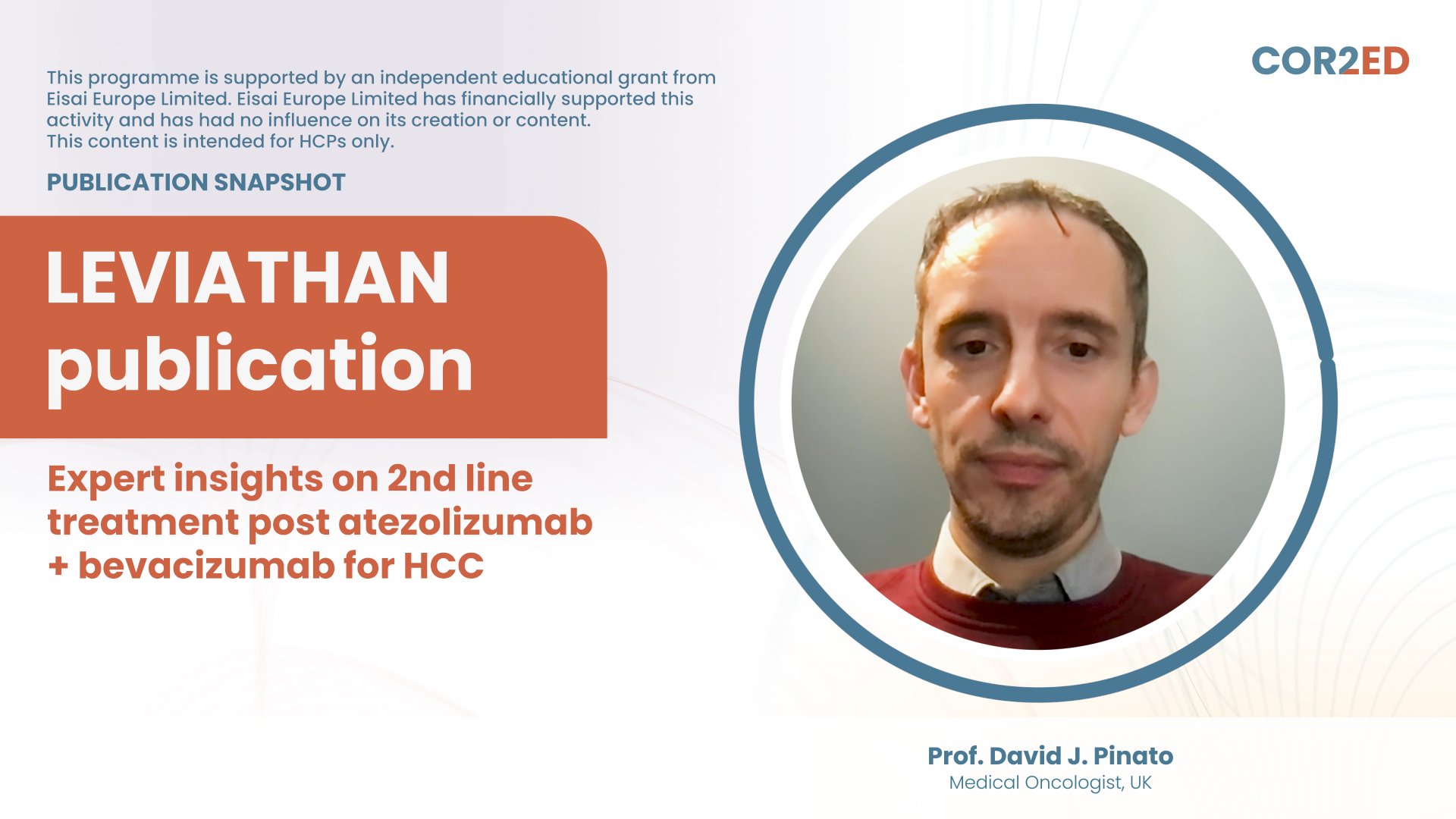Early-onset colorectal cancer
Renata D’Alpino Peixoto
Hi everyone, welcome to our GI CONNECT newsletter on early-onset colorectal cancer. It's a pleasure for me to be here with a friend of mine, a colleague of mine, who is also an oncologist with a focus on GI cancer, who is Hans Prenen from Belgium. And we are going to discuss about early-onset colorectal cancer. Welcome, Hans.
Early-onset colorectal cancer: definition and epidemiology
Hans Prenen
So I will maybe start by saying what the definition is of early-onset colorectal cancer. It's defined as colon and rectal cancers diagnosed in persons less than 50 years of age. So we know that in the US and other high-income countries there's an increase in cases of early-onset colorectal cancer. It's important to mention this is not the case all around the world, it seems to be more in the high-income countries. And for example, in the US, the incidence has risen from 8 cases per 100,000 in 1998 to around 13 cases per 100,000 in 2015. So this is about 10% also of all new CRC diagnosed. So it's still a subgroup which is rising. And one of the key questions is whether early-onset and late-onset colorectal cancer are the same disease. And if early-onset colorectal cancer is caused by a unique underlying mechanism, that is maybe impacted by different risk factors.
Early-onset colorectal cancer: risk factors
So what are these potential causes and risk factors? We know that most cases are sporadic, so hereditary syndromes are a bit more frequent in early-onset colon cancer. But still, it's worth mentioning that the incidences of familial syndromes are stable, so this is not explaining why there is a rise in early-onset colon cancer. It's important to mention that in one out of six patients you can find a pathogenic germline variant, so very important to ask about family history in this group of patients.
So what are the risk factors? There is more obesity, specifically abdominal fat. We have also the use of more red and processed meat in western countries specifically, as well as processed sugar. And also, of course, I don't have to tell you, we have a more sedentary behaviour. We are all sitting at a desk for a lot of the day, it’s not good for our risk for colon cancer and all of these factors, they are influencing the gut microbiome. We will not go into detail, but the microbiome can alter the inflammatory and immune environment and that can influence carcinogenesis. So we know the microbiome plays an important role, but we still try to figure out what's the exact role in the carcinogenesis of colon cancer.
Early-onset colorectal cancer: disease characteristics and diagnosis
Renata D’Alpino Peixoto
Actually, talking a little bit about disease characteristics in early-onset colorectal cancer, we know that more than 70% of those patients have tumours located in the left colon. So this is a unique thing that we see among early-onset colorectal cancer patients. So the disease can also have higher rates of poorly differentiated tumours and sometimes more frequent signet ring cells.
Also, because those patients that have a higher incidence of Lynch syndrome, which you already mentioned. There's also higher risk of metachronous disease among those young patients and also more advanced disease, more advanced stages of diagnosis. So maybe because tumour biology may be a little bit more aggressive or probably because of delayed diagnosis among those young patients.
Another issue, another issue about clinical presentation is that the most common symptoms among young patients are haematochezia, abdominal or pelvic pain and bloating, and also change in bowel habits. So those symptoms are also typical regarding distal tumours and the symptoms frequently are attributed to common benign conditions, so sometimes the disease is diagnosed at later stages because of that. And also there is less awareness of colorectal cancer among young patients and also among healthcare providers, which makes the diagnosis even later.
And talking a little bit about molecular features of early-onset colorectal cancer. So we see a little bit more of MSI high tumours, especially because of Lynch syndrome. So one in every six patients with early-onset colorectal cancers have Lynch syndrome. And there is a question that is still debatable about the distinct molecular features, features between early-onset and late-onset colorectal cancer. So there are some controversial findings. So some studies point towards some small differences about them. So for instance, there is one study that showed that APC, KRAS and BRAF are more common among older patients and for instance, TP53 and CTNNB1 are more frequent among early-onset disease.
So I think more studies are needed so that we can really find out that we have really different molecular features between early-onset and late-onset colorectal disease.
Hans Prenen
I think also what is important to mention is that patients below 50 is still a large group. You also have patients that are diagnosed at the age of, let's say, 20 or 25 or even younger, without having a family syndrome. And if we look there into their molecular data, you see that they sometimes also have different molecular features than the ones that are maybe a bit older. So I think there's still a field which needs to be studied more and more in the future.
Early-onset colorectal cancer: treatment considerations
So, Renata, if you think about, let's say, the treatment recommendations in this group. Should we treat them a bit different than we treat with the later-onset colon cancers?
Renata D’Alpino Peixoto
Yeah, that's a great question. Unfortunately, we don't have clinical trials trying to answer those questions for us. So right now, I would say that we tend to be a little bit more aggressive with young patients. I think we give more adjuvant treatments for them when we compare to older patients. So sometimes even more intense treatment, for instance, a right-sided metastatic colorectal cancer, sometimes we would give triplet therapy instead of doublet for young patients when we compare to older patients. So I think there might be some differences in our practice. What do you think?
Hans Prenen
Yeah, I think it's mainly for the adjuvant setting, I'm a bit worried here because, you know, we have these long-term side effects such as neurotoxicity and specifically if you have a young group treating with this therapy, we are discussing about years now for these three versus six months of adjuvant therapy. And I think it's very important that we shouldn't over-treat them with oxaliplatin in the adjuvant setting because of the long-term neurotoxicity.
The question of whether we should give capecitabine versus 5FU, I don't think it's answered yet. So both options are feasible. But given the recent data, I'm personally more a big fan of giving, let's say CAPOX where you give short-term oxaliplatin and then continue with capecitabine, for example.
Renata D’Alpino Peixoto
Excellent. I tried to do the same in my practice as well. Hans, what do you think about the impact of colorectal cancer diagnosis and also treatment in the quality of life of patients with early-onset colorectal cancer?
Hans Prenen
I think it's an important one, and this is something we have to keep in mind in all young patients with cancer, because, of course, we try to cure as many as possible, but once they are cured, we also have to think about the long-term effects and also the effects on their career. Some have a stoma which they have to live with, so it has a lot of impact, I think, on these patients. Don't you agree?
Renata D’Alpino Peixoto
Oh, totally. I think it's a major issue. And also about their reproductive health and family planning, sexual health, the issues about genetic counselling, nutrition. There are a lot of problems that those patients face and also others like psychosocial distress to spirituality and existential concerns, like mental well-being. I think there are many, many problems that those patients may face during their lifetime, living with the diagnosis of early-onset colorectal cancer.
Hans Prenen
I think one last message is that as the incidence is increasing, I think we also have to think about finding a way, a cost-effective way, and also feasible way to screen those patients. Because if you say let's do a colonoscopy for screening in everybody below 50, I don't think it's feasible. But we're working more and more, and let's call it the liquid biopsy of the blood type tests for those under 50, to find those few people with colon cancer.
Early-onset colorectal cancer: take-home messages
Renata D’Alpino Peixoto
So Hans, what do you think are the take-home messages from this newsletter?
Hans Prenen
The most important one is that the incidence of early-onset colorectal cancer is rising. So just be aware that it's not because you're below 50 the chance of colon cancer is not there, even if have just symptoms or maybe slight bleeding or whatever, and that you always ask for family history in these patients as some patients have also germline variants.
And then also, finally, we have to think about this more as a GI community, how to find a cost-effective and feasible way of screening patients to find them. Because as you know, if you find them in an early stage, we can cure them.
I would also like to invite our listeners to go to the GI CONNECT website if you want to hear more or to read more on the slides which can be found on that site. Thank you.





 Downloadable
Downloadable  6 MIN
6 MIN
 Dec 2025
Dec 2025 








